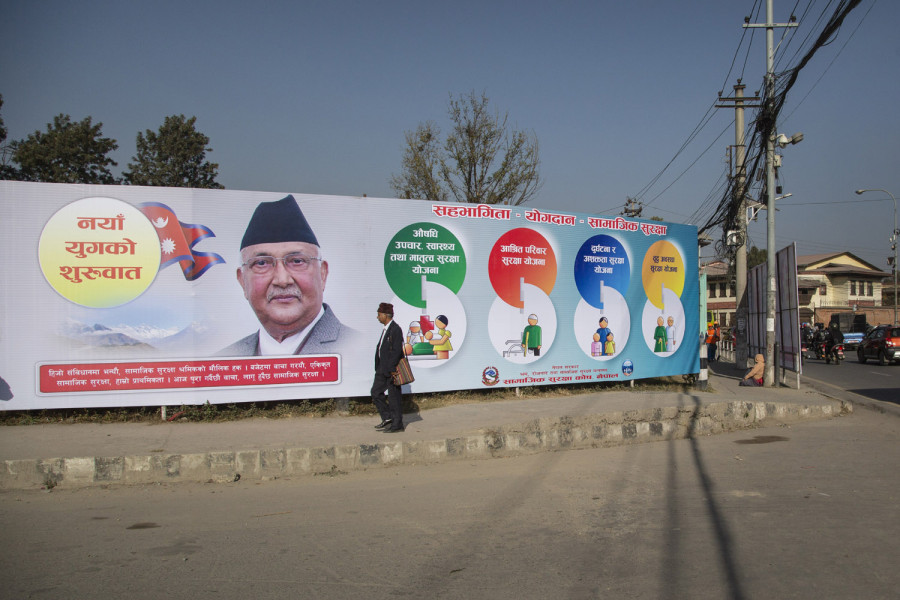National
Two years on, social security scheme fails to gather momentum
Labour rights groups doubt government, employers are committed to implementing the scheme and demand informal workers and self-employed be included.
Chandan Kumar Mandal
Labour rights groups are dissatisfied with progress so far achieved in implementing the contribution-based social security scheme rolled out two years ago amid fanfare.
As the country observed the third Social Security Day on Thursday to commemorate the start of the social security scheme in November 2018, various labour rights groups have doubted the government is committed to implementing the scheme.
In their joint statement on the occasion, three major trade unions—the General Federation of Nepalese Trade Unions (GEFONT), Nepal Trade Union Congress (NTUC) and All Nepal Trade Union Federation (ANTUF)—associated with the International Trade Union Confederation-Nepal Affiliate Council (ITUC-NAC) said the scheme, hailed as the beginning of the new era by the Oli-government, has failed to gain traction among workers and employers.
In its two years, the scheme, which was rolled out to cover formal private-sector workers, has enrolled 12,915 employers and 179,791 workers to collect over Rs3.1 billion from them.
“There are more than 300,000 organisations and hundreds of thousands of workers in the labour market, but that their enrollment rate is low shows the scheme has failed to attract members of the broader labour market,” said Binod Shrestha, president of GEFONT. “The bigger the participation of contributors to the scheme, the wider the facilities and coverage workers receive from the scheme. However, the initial response raises questions about the sustainability of the scheme and its programmes.”
When the contribution-based social security scheme was rolled out in 2018, the government had aimed to enroll nearly 3.5 million people in a national campaign to ensure social security for private-sector workers with a comprehensive welfare package.
The arrival of the scheme was hailed by both labour rights organisations and the private sector as a much-needed step towards dignifying the labour sector and protecting labourers. However, the scheme has failed to take off as expected in the last two years.
“Although the government introduced policies and plans in coordination with labour rights groups and employers, neither private sector employers nor the government has been serious towards its effective implementation,” said Shrestha, also the president of (ITUC-NAC), an organisation of the three largest trade unions in the country. “Looking at the progress made in enrollment and contribution, even leaders of employer organisations involved in policy formulation, have not remained honest to its implementation as their own organisations have not enrolled themselves.”
Trade unions have also pointed out that government agencies’ indifference towards the effective enforcement of the scheme, launched with excessive promotions from the government. That the workers who are on government agencies’ contract, those earning daily wages and those working on temporary basis are not being enrolled under the scheme only shows the weak commitment of the government, but also leaves no ground to pressurising the private sector to enroll, said labour rights activists.
The scheme offers financial security under four categories of support—medical treatment, health protection and maternity plan; accidents and disability plan; dependent family plan; and old-age security plan—to private-sector workers once they start contributing.
To avail the facilities under the scheme, both employers and workers are required to contribute to the Social Security Fund every month. An amount equivalent to 31 percent of a worker’s basic salary—11 percent deducted from the worker’s monthly salary and 20 percent employer’s contribution— is deposited to the fund.
Labour rights organisations have also demanded coverage be extended to informal and the self-employment sectors. Other changes are also needed to make the scheme more popular among workers and employers, they said.
“When the scheme was introduced, workers had high hopes. But they are unable to reap its benefit as they should have done. Workers engaged in informal and self-employment sector workers must be included in this scheme as well,” said Pushkar Acharya, president of NTUC. “We had also thought that the scheme would provide relief to Covid-19 affected workers, but it could not do so. Last year, we had requested the government to cover the informal and self-employment sector as well, but it has not happened so far.”
They have demanded that the unemployment insurance plan be immediately begun and medical treatment and health protection plan also cover dependent family members of contributors to the scheme.
Speaking at a virtual event organised to mark social security day, Kapil Mani Gyawali, executive director of the Social Security Fund, said the government was on its final lap to allow the registration of workers in the informal sector, the self-employed and workers involved with government-owned organisations and corporations, through a second amendment to the funds’ rules.
Labour, Employment and Social Security Minister Rameshwar Ray Yadav said the government was committed towards implementing the scheme to protect the country’s labour force.
“The government will soon make required changes to the working procedures of the scheme and come up with attractive plans,” said Yadav. “Workers engaged in informal and self-employment sectors will soon come under the coverage of the scheme which has been only protecting formal sector workers.”




 21.12°C Kathmandu
21.12°C Kathmandu














